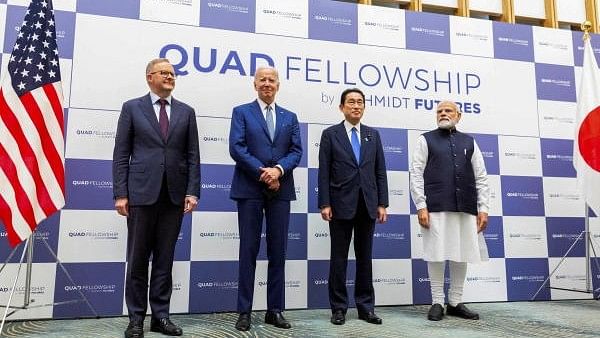
Summit meeting with Quad leaders, in Tokyo - Australian Prime Minister Anthony Albanese, US President Joe Biden, Japanese Prime Minister Fumio Kishida and Indian Prime Minister Narendra Modi attend the Japan-US-Australia-India Fellowship Founding Celebration event, in Tokyo, Japan, May 24, 2022.
Credit: Reuters File Photo
New Delhi: The leaders of India, Australia, Japan, and the United States will discuss a proposal for co-operation in maritime patrolling in the Indo-Pacific region on September 21 – making a subtle move to respond to the muscle flexing by China.
Prime Minister Narendra Modi, his Japanese and Australian counterparts Fumio Kishida and Anthony Albanese, and American President Joe Biden will hold the fourth in-person summit of the Quad at Wilmington, Delaware in the United States on September 21.
They will discuss a proposal for co-operation among the coast guards of the four nations for patrolling to monitor maritime traffic in the Indo-Pacific region, and combat illegal, unreported, and unregulated fishing, a source in New Delhi told DH.
The Quad – unlike the AUKUS initiative by Australia, the UK, and the US – is not a security alliance and has been pursuing a rather benign agenda to counter China’s bid to spread its military, political, and economic influence in the Indo-Pacific. That is why the proposed move by the four nations towards joint and coordinated maritime patrolling is likely to be launched with the professed objective of combating illegal fishing.
However, according to the source, New Delhi, Canberra, Tokyo, and Washington DC are also keen on this project to send out a message to Beijing, particularly in view of China’s increasing use of its maritime militia – comprising hundreds of fishing vessels including some with military-grade build and equipment – to assert its expansive territorial claims in the Indo-Pacific region, particularly in the South China Sea, the East China Sea and the Taiwan Strait.
China has been using its maritime militia for its “grey zone actions” to deny the fishing vessels of Japan and the Philippines access to maritime resources in the Indo-Pacific, avoiding deployment of the assets of its coast guard and People’s Liberation Army Navy (PLAN) and minimising the risks of escalation into military conflicts.
New Delhi in the past resisted the US bid to turn the Quad into an ‘Indo-Pacific NATO’. India has been insisting that Quad should keep pursuing benign non-military initiatives instead of turning overtly adversarial to China.
However, with the Chinese PLAN deploying an increasing number of warships in the Indian Ocean over the past few years and about 250-300 fishing vessels of the communist country being spotted in the region annually, India agreed to join Japan, Australia, and the United States in exploring the possibility of enhancing cooperation in maritime patrolling.
Modi, Kishida, Albanese, and Biden will also review the progress of the Indo-Pacific Partnership for Maritime Domain Awareness (IPMDA). Since its launch during the Quad Summit in Tokyo in May 2022, the pilot programmes under the IPMDA were rolled out for countries in Southeast Asia and the Pacific. The coverage is now being expanded to the Indian Ocean region, where the Chinese PLAN’s presence over the past few years triggered concerns for New Delhi.
The IPMDA was launched by the Quad with the professed objective of helping the Indo-Pacific nations combat illegal, unreported, and unregulated fishing (IUU fishing), although the network developed by linking the satellites of India, Australia, Japan, and the US for the purpose could also double up to keep watch on the Chinese PLAN’s aggressive moves in the Indo-Pacific regions.
The Information Fusion Centre – Indian Ocean Region based in Gurugram in India is playing a key role in implementing the IPMDA, in coordination with other such agencies in Japan, Australia, and the United States. The IFC-IOR is run by the Indian Navy.
The four nations are now discussing options to provide the enhanced capability to additional partners in the coming months. The leaders of the Quad will, on September 21, discuss ways to deepen engagement with regional partners to support maritime safety and security and uphold international law, said the source in New Delhi.
